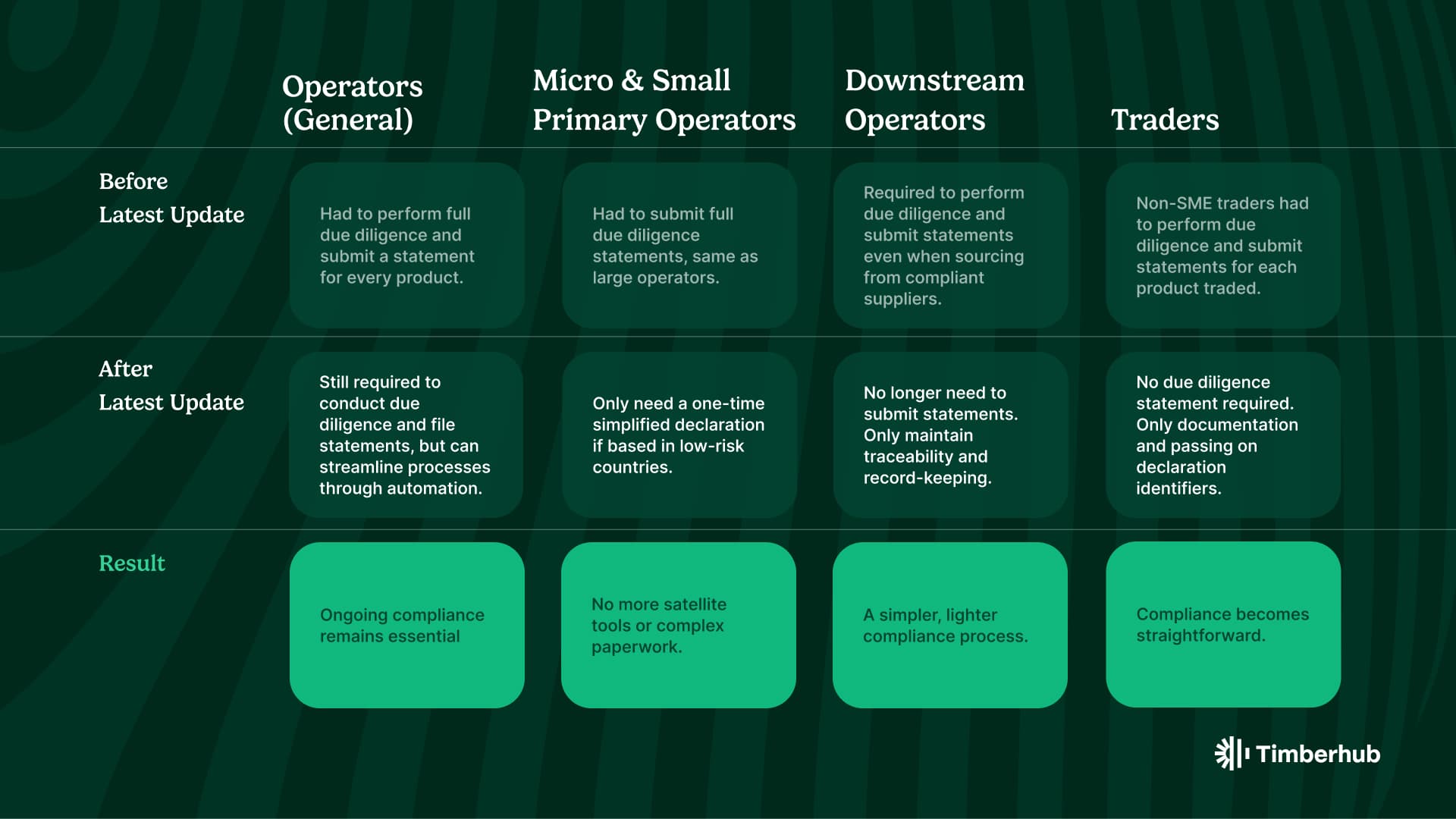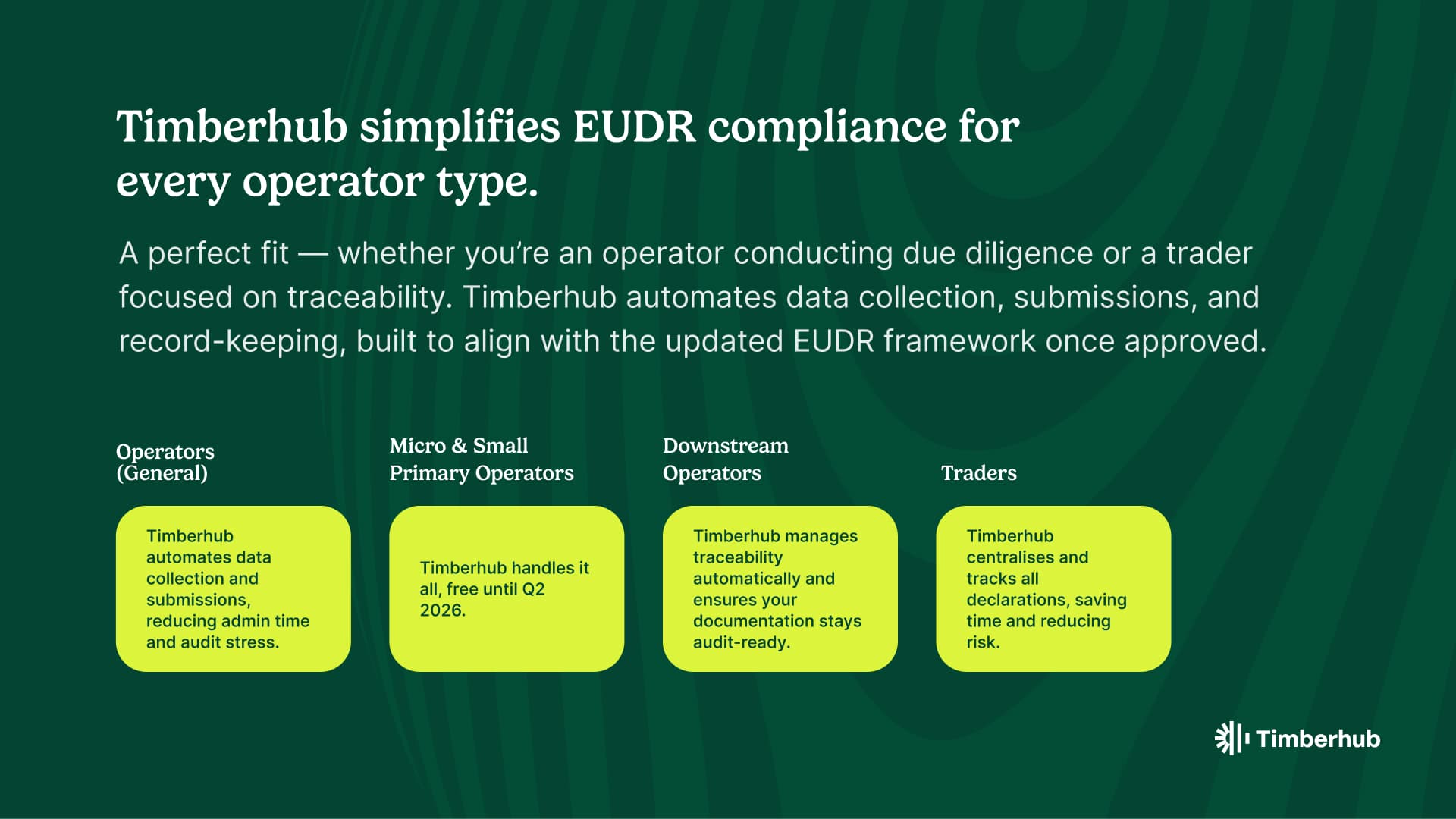
EUDR Amendment Proposal: What Might Change and the Road Ahead
8 min reading
Bruno Fardilha
04/11/2025
What Would Change
New Roles and Obligations
New Dates and Implementation
New Enforcement
What Does Not Change
What This Means for Businesses
The Road Ahead
On 21 October 2025, the European Commission published a proposal to amend the EU Deforestation Regulation (EUDR).
The goal is to make the Regulation easier to implement and to reduce the administrative burden for companies — without weakening its environmental ambition.
For now, it's important to note that this is only a proposal. It must still go through the European Parliament and the Council of the EU before becoming law. The original EUDR (Regulation (EU) 2023/1115) remains in place as the official reference.
What Would Change if the Proposal Is Approved
The proposal introduces three key changes — new roles, new timelines, and updated enforcement rules.
1. New Roles and Simplified Obligations
The Commission aims to make the EUDR clearer and more proportionate by introducing new categories of operators and simplifying obligations for smaller players.
The proposal introduces two new categories of operators:
- Micro and Small Primary Operators — small producers placing their own goods on the market. (Micro enterprises have fewer than 10 employees and turnover under €2 million; small enterprises have fewer than 50 employees and turnover under €10 million.)
- Downstream Operators — manufacturers or retailers using products already covered by a due diligence statement.
Operators — companies placing or exporting EUDR-covered commodities or products — would still need to carry out full due diligence and file a Due Diligence Statement (DDS) in the EU's TRACES system before placing goods on the market.
Downstream operators and traders, on the other hand, would no longer have to submit DDSs. Instead, they would need to register (if not SMEs), store and forward DDS reference numbers or declaration IDs, and inform authorities if they identify any risks or signs of non-compliance.
Finally, micro and small primary operators in low-risk countries would be allowed to replace the DDS with a one-time simplified declaration. This declaration would still feed into TRACES and generate a unique identifier. That ID would follow their goods through the supply chain, keeping traceability intact.
In short, the proposal reduces paperwork for smaller and downstream actors, but it does not remove accountability. Any company that knowingly trades non-compliant material can still face penalties.
2. New Dates and Phased Implementation
The amendment does not delay the EUDR's main start date of 30 December 2025. From that date, operators will still be expected to submit DDSs.
What the proposal does introduce is a grace period and a clearer rollout plan.
Authorities would begin conducting checks on 30 June 2026, while micro and small operators would have until 30 December 2026 to comply.
This phased approach gives the system time to run smoothly and provides smaller businesses with a few extra months to get ready.
3. New Enforcement and Penalties
The proposal also aims to make enforcement more predictable and consistent across Member States. It sets specific inspection targets based on risk levels: 9% of operators and products from high-risk sources, 3% from standard-risk, and 1% from low-risk.
Penalties will remain strong — with fines of up to 4% of a company's EU-wide turnover, the confiscation of goods or profits, and possible temporary bans from public procurement or EU funding.
During the initial adjustment period, authorities may also issue warnings or corrective recommendations to help businesses comply.
What Does Not Change
Despite these adjustments, the EUDR's core mission remains the same: ensuring that products sold or exported from the EU are deforestation-free, legally produced, and traceable.
Operators — those who place products on the EU market — will still need to perform full risk assessments and mitigation measures before submitting their DDS.
Traceability remains essential for everyone, including downstream actors, because each product must still be linked to a valid DDS or declaration identifier.
Even companies exempt from filing DDSs must keep an eye on their suppliers and act responsibly if issues arise. Turning a blind eye to red flags in the supply chain can still lead to sanctions.
What This Means for Businesses
If approved, the amendment would make compliance easier for many companies — but not optional. Operators will continue to carry the main due diligence responsibility by assessing suppliers, checking geolocation data, analysing deforestation risks, and documenting their mitigation measures before placing products on the EU market.
Downstream operators and traders will focus more on traceability — recording, storing, and passing on DDS or declaration identifiers, and reporting any concerns to authorities. Meanwhile, micro and small primary operators in low-risk countries will only need to submit a one-time simplified declaration and update it if their circumstances change.
In short, the EUDR may get simpler, but that does not make it optional. Every company in the supply chain still plays a role in ensuring deforestation-free trade.
From Uniform to Proportionate Compliance
The amendment represents a clear shift from uniform due diligence to proportionate, risk-based compliance.
Smaller and downstream actors now face simpler, cheaper requirements, while full operators continue to maintain full due diligence duties.
The result? Fewer satellite analyses, less administrative work, and a stronger case for outsourcing compliance end-to-end.
What Changes for Each Type of Operator
The visual below illustrates how responsibilities would change under the proposed amendment:

The Road Ahead
The proposal now moves to the legislative phase, where it will be debated and potentially amended by the European Parliament and the Council. Nevertheless, the EUDR's core principles of deforestation-free sourcing and traceability are here to stay. And with enforcement scheduled to start in just a few months, there is little time left to wait and see.
At Timberhub, we see this proposal as a reminder that companies need to prepare smarter, not later. Even if the amendment passes, businesses will still require reliable systems for risk management, documentation, and traceability to stay compliant.
Why Timberhub's Approach Is Different
While most solutions on the market still rely on costly and complex compliance tools — from satellite imagery and manual risk assessments to consultant-heavy verification — Timberhub takes a different approach.
We offer a fully outsourced compliance solution that automates data collection, manages due diligence statements and declarations, and keeps you audit-ready at all times.
It's an end-to-end service that removes the administrative and technical burden from your team — and it's free until Q2 2026.

EUDR is happening, and Timberhub is here to make sure your business stays ahead of it.
Try Our EUDR Compliance Tool
Join the early access program and be among the first to experience our EUDR compliance solution.
